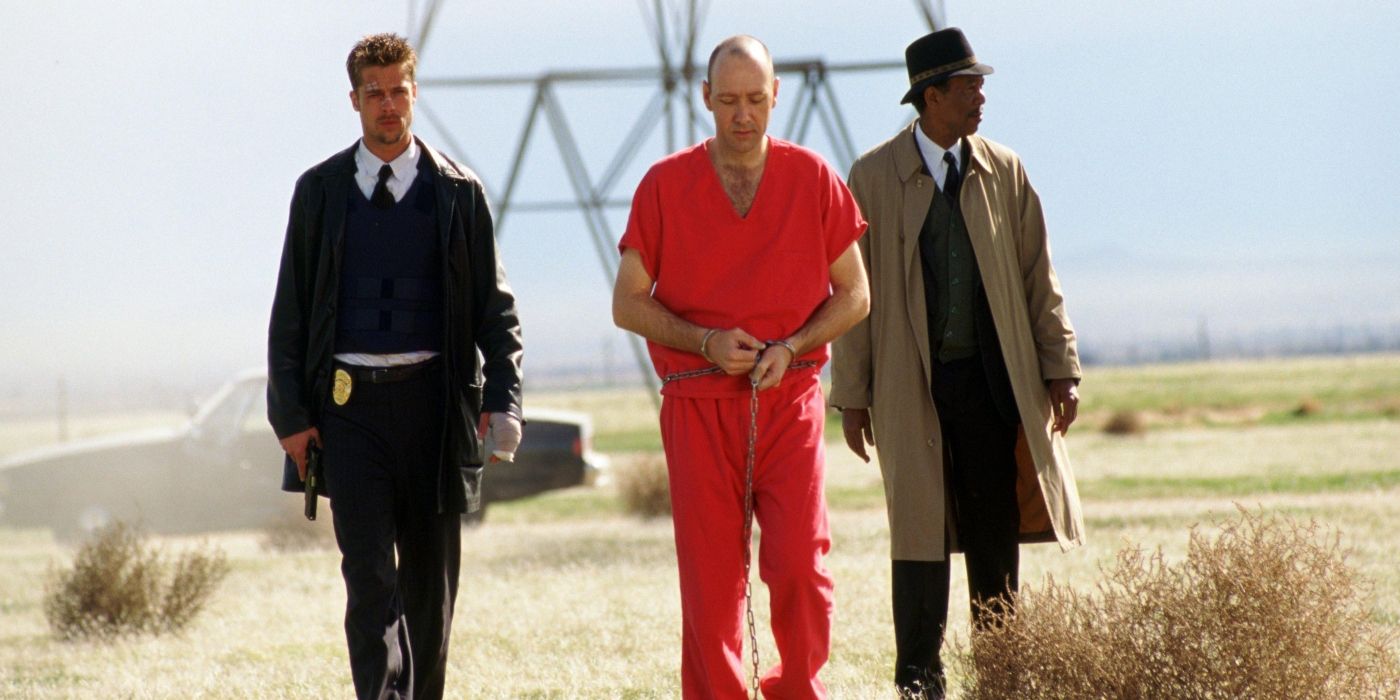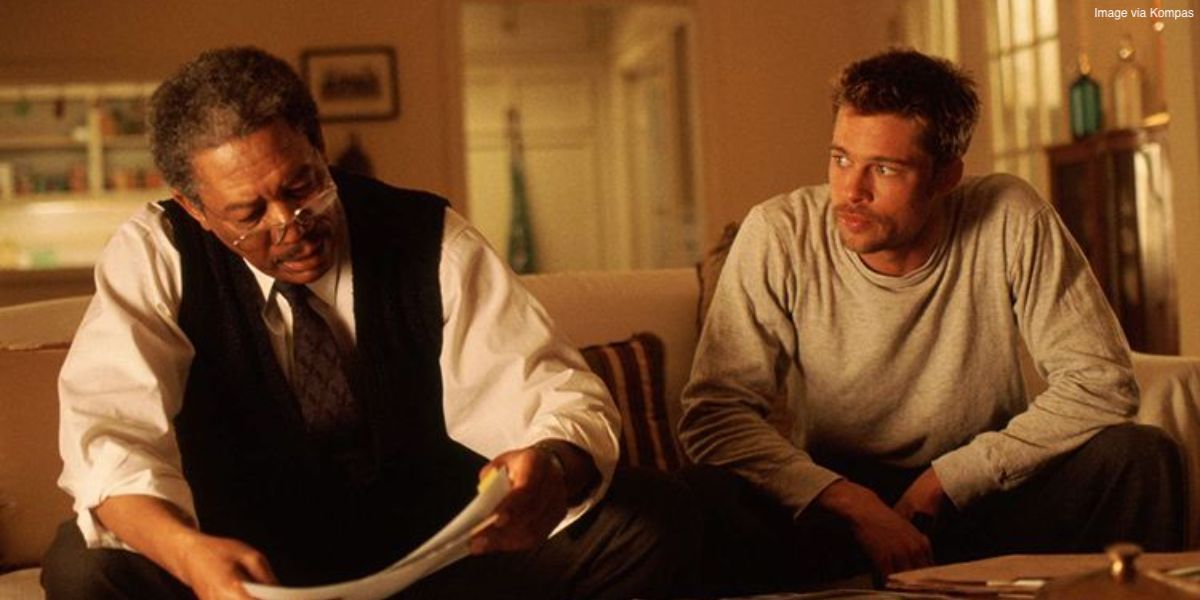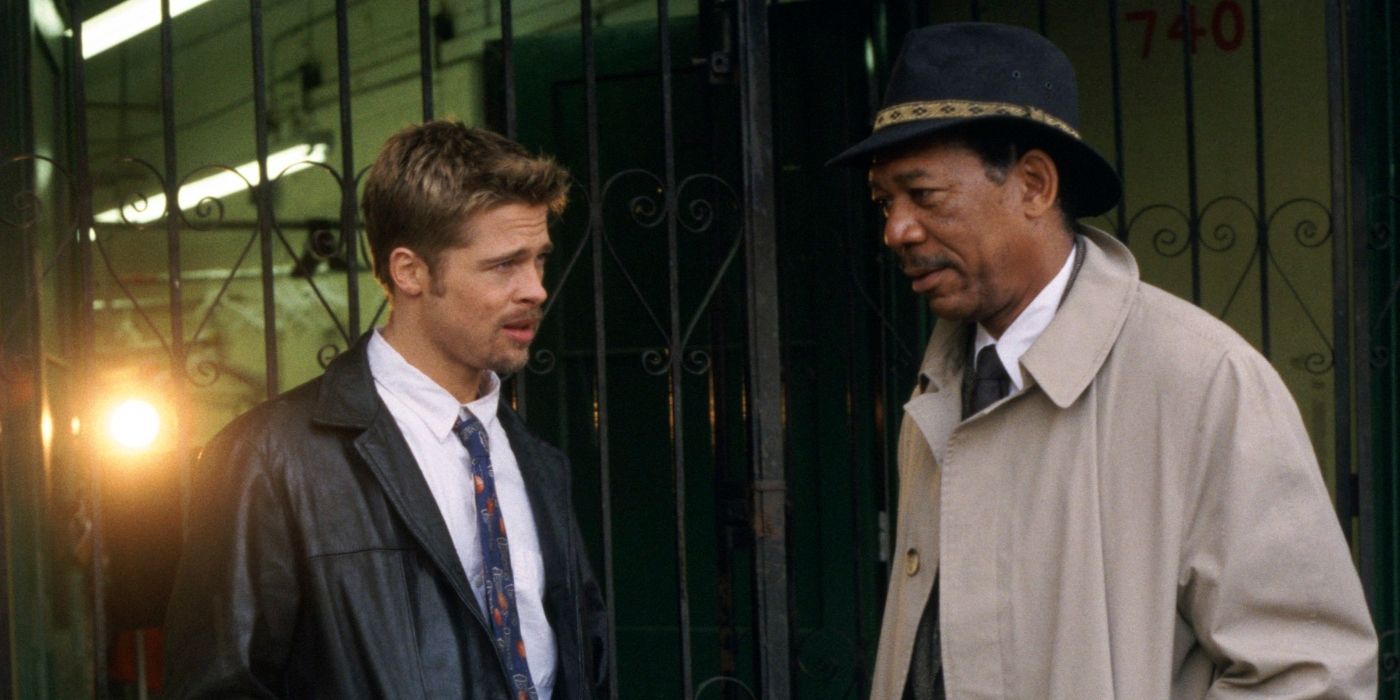Things could’ve ended quite differently for Somerset and Mills.
When it comes to David Fincher’s Seven, it’s hard to think about the intense psychological thriller without the ending clearly in mind. This Brad Pitt and Morgan Freeman crime drama hit theaters smack in the middle of the 1990s and frightened audiences at every turn. From the first breath of the sloth victim to the moment Kevin Spacey’s John Doe arrives at the police station, we are strapped to the edge of our seats. But it’s once we get to that climactic finale in the middle of nowhere that things get truly terrifying. Yes, there is a head in the box in the film’s final cut, but there almost wasn’t. Believe it or not, there are actually seven other ways that Se7en might have ended had the studio, the actors, or the director himself gotten their way. If you’ve ever been curious about how Detectives David Mills and William Somerset might have done things differently, look no further than here.
How Does David Fincher’s ‘Se7en’ Actually End?
We all know how Seven ends by now, right? After Doe arrives to turn himself in for the five heinous crimes he’s been shown to have committed, he leads Somerset and Mills (who was nearly played by Denzel Washington) to a far-off location where they find themselves beneath an array of massive powerlines. There, a delivery van shows up at the appointed time, and Somerset waves down the driver. Upon obtaining the package, he opens it and, to his horror, discovers that inside lies the disembodied head of Mills’ pregnant wife, Tracy (Gwyneth Paltrow). Though Somerset had been told in a moment of confidence by Tracy earlier, Mills didn’t know his wife was pregnant. But once he finds out, after Doe taunts him with the news, he can’t handle it. Doe reveals that his sin was always envy, and thus Mills becomes the deadly sin of wrath as he kills the serial killer in front of Somerset and the other cops watching from the helicopter above.
Sometime later, the police collect Mills, who can’t handle what has happened to him, and Somerset tells his superiors that he’ll be sticking around, despite his initial plans to retire after this case. In a final voiceover, Somerset explains that, “Ernest Hemingway once wrote: ‘The world is a fine place, and worth fighting for.’ I agree with the second part.” Unsurprisingly, Seven’s gut-punching finale made waves with critics and audiences alike, who hailed the twist ending as a marvel in modern filmmaking. To this day, the film is still considered one of the best thrillers out there, and its impressive box-office returns prompted a variety of rip-offs and similarly movies in the coming years. But would all of that have been possible without the shocking ending?
Morgan Freeman’s Somerset Nearly Killed John Doe at the End of ‘Se7en’

According to The Telegraph, one (1) proposed ending to Se7en involved Somerset killing John Doe instead of Mills. Given Somserset’s fatherly relationship with Tracy, it would make sense that he, too, would want revenge for her murder. After all, she had confided in her husband’s partner about her pregnancy, inquired about Somerset’s own romantic history, and welcomed the lone detective into her home. More than that, Somerset is the one who opens the box and sees Tracy’s head lying there inside, which would easily be enough motivation to kill the man responsible. Storyboards for this scene also reveal a pretty horrific piece of dialogue that just wouldn’t have felt right during such an intense moment, with Mills asking his partner what he’s done and Somerset responding with, “I’m retiring,” after firing his weapon at the killer.
Per the Seven commentary, this is Morgan Freeman’s preferred ending. According to the actor, it’s the only ending that allows Mills to live his own life afterward, with the hope being that Mills will continue to fight the good fight now that Somerset is gone. Naturally, Brad Pitt disagreed, noting that Mills would never be able to move on from what happened to Tracy, and this was the most visceral and honest reaction to her murder. In another draft of Andrew Kevin Walker’s infamous screenplay, a different ending (2) can be found where Somerset attempts to stop Mills from killing Doe by pulling a switchblade on him. Mills stops his partner by shooting him before killing Doe himself. This version of the movie ends with Somerset receiving a note from Mills while in the hospital, who tells him that he was right about everything.
Brad Pitt Didn’t Like the Studio’s Proposed “Happy Ending”

The ending to Seven didn’t have to be so bleak though. In another proposed ending (3), Tracy actually survives her encounter with John Doe. The Telegraph notes that the studio wasn’t terribly excited about the idea that Tracy’s head would be found boxed up at the end, leading to our hero slaughtering our villain on sight. Instead, they hoped for a more traditional, Hollywood “happy ending” to the gruesome narrative, in which Doe actually kidnaps Mills’ wife on camera. Here, our heroes would be forced to race against the clock to save her, eventually ending the film with Doe’s defeat and the reunion between the Mills family, with a third on the way. But the director and his leading man weren’t too keen on the studio’s horrible notes.
“With Se7en, I said, ‘I will do it on one condition — the head stays in the box,'” Brad Pitt revealed to Entertainment Weekly back in 2011. “‘Put in the contract that the head stays in the box.’ Actually, there was a second thing, too: ‘He’s got to shoot the killer in the end. He doesn’t do the ‘right’ thing, he does the thing of passion.” Mills certainly does the passionate thing in the end. While we don’t know what becomes of the fallen detective following the fade to black, we do know that he avenged his wife and unborn child’s murder. To make things even worse, another proposed ending (4) would’ve seen a different sort of head in the box… “They go, “You know, he would be much more heroic if he didn’t shoot John Doe — and it’s too unsettling with the head in the box,” Pitt explained. “We think maybe if it was the dog’s head in the box…” Talk about an anticlimactic end.
‘Se7en’ Could’ve Ended Inside an Abandoned Church
One ending (5) that would have been interesting to see realized was a third act that ended in an abandoned church. Before Fincher was attached to the script, Jeremiah S. Chechik of National Lampoon’s Christmas Vacation fame was in talks to direct, and after reading Walker’s original screenplay, he had some notes, one of which was to change the ending to being set in a burning church. Though Walker wasn’t happy with the changes, he wrote them anyway. In keeping with Seven’s complex religious iconography, this finale would’ve seen Mills and Somerset track Doe down to this church, which is promptly set on fire. Here, Doe ties Mills up, envious of his life, and carves a cross into the man’s chest.
To make things more interesting, Somerset shoots Doe, but it’s too late. Mills dies in the scuffle, and the film ends with Tracy heartbroken and abandoning the city. Somerset tells her to take care of both herself and the baby, and the film ends after that. Had Chechik directed the picture, this is likely how the film would’ve ended. While it’s not actually a terrible ending, it isn’t as novel as Walker’s original script, which accidentally made it to Fincher’s desk. “[Fincher] expressed some interest, but in expressing his interest to them, had mentioned there was a head in the box,” Walker explained. “And they were like, ‘Oh, no, no, no. We sent you the wrong draft.’ And then they sent him the vastly rewritten, Jeremiah Chechik draft, which had a completely different ending and Fincher said, ‘No, I wouldn’t be interested in doing that.'” Thankfully, it worked out that Fincher got the gig, and thus the dramatic ending we remember today is the one we’ve got.
David Fincher’s ‘Se7en’ Ending Was Perfect

But even the ending we got wasn’t the only version of these events that could have been. Though not exactly an alternate ending since it still tackles the same general events, the filmmakers shot another version of the climax (6) which was deemed, well, less dramatic. While they were storyboarding the “Somerset kills Doe” ending for the studio, Fincher shot a “softer” version of the film’s traditional ending with Mills killing Doe. Positive test screenings ultimately led to the filmmakers adding more additional content (which was much more “intense” than what was previously shown) into the feature. But even this wasn’t exactly what David Fincher was hoping for.
According to the director’s commentary, for the final alternate ending (7), Fincher wanted the film to cut to black at the exact moment Mills shot Doe. This would’ve left audiences with a horrible taste in their mouth, and while this innovative transition may have been more visceral than what we got in the theatrical cut, there’s a reason the studio refused to go for it. “It was from this ending that we went to the ending with the gunshots down, and we went to black,” Fincher explained, noting that it was their last time they tried to push the “cut to black” idea. “It was from that subsequent cut that we decided we needed to write the coda.” Fincher may not love the Hemingway quote at the tail-end of Seven, but it’s a final moment of reflection on the film’s events that is necessary given the heaviness the film leaves us with.


